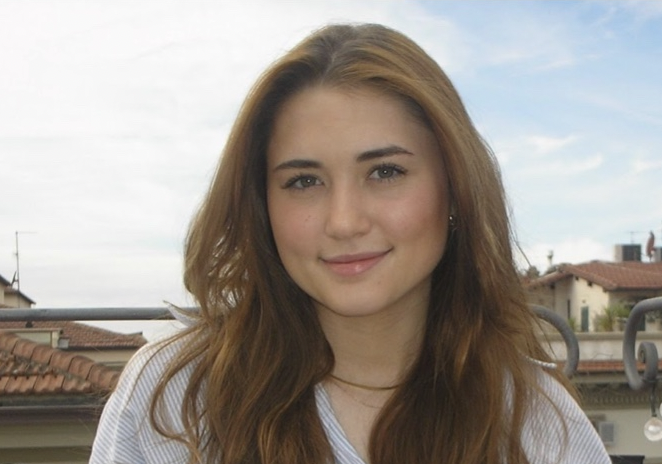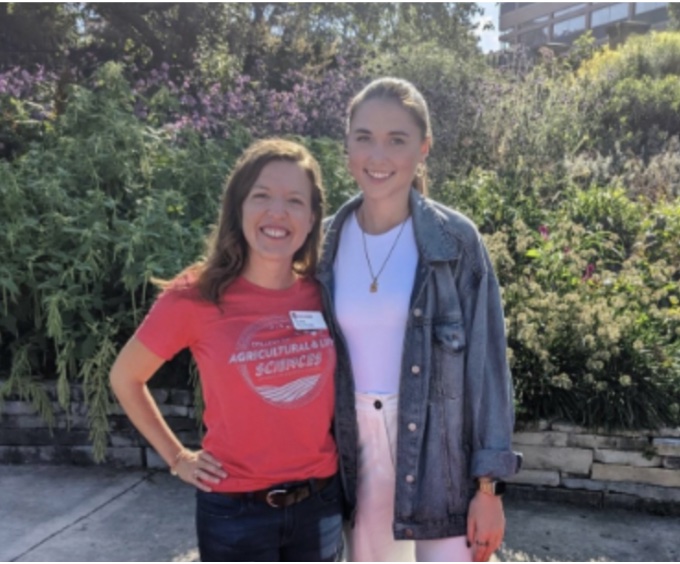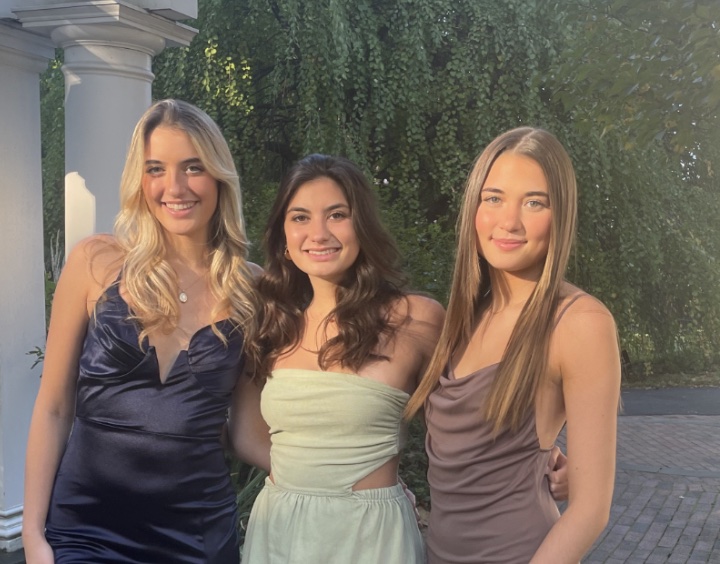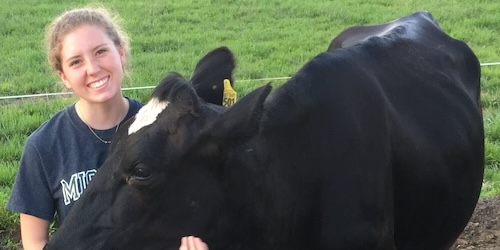Get To Know Student Communications Specialist Hannah Cheren
April 24, 2023During her two-year tenure with the Morgridge Institute for Research - Research Computing lab, Hannah Cheren made significant science writing contributions and along the way changed the direction of her life.

Hannah is a senior undergraduate student in Life Sciences Communications and Statistics, simultaneously working towards a certificate in Data Science. She is a contributing writer for the Center for High Throughput Computing (CHTC) and the National Science Foundation funded PATh project, publishing 19 science and research computing articles describing high-throughput research computing and highlighting the researchers who utilize these organizations’ services. After her graduation this May, Hannah will be joining a public relations and communications consulting group for the life sciences as an Account Coordinator.
Hannah takes her well-earned center-stage to share a bit about herself, experiences and professional trajectory so far, as well as her plans after graduation.
What piqued your interest in life sciences communication?
I came to college intending to be a computer science major, but I immediately realized it wasn’t for me. I had a bit of a freak-out moment, but eventually made my way to the career advising office, where I was given a list of all the majors offered by the university so I could see all my options at a glance.
Life Sciences Communication (LSC) stood out to me as an interesting route because I have always had an interest in writing and communications. I still felt like I didn’t know much about LSC, so I reached out to Tera Wagner, the former Life Sciences Communication advisor, who really sold it to me.

Hannah Cheren and former LSC advisor, Tera Wagner.
What drew me in was how different it is from journalism and other communications-based majors in the sense that you’re taught to take complex scientific information and translate it to a more easily digestible version that just about anybody can understand!
How did you hear about / get started as a writer with the OSG/PATh communications team at Morgridge?
I learned about the job position from the advisor I just spoke about, Tera Wagner. She thought it might be a good fit for me, and it turns out it was!
Why this position in particular?
The job description captured my attention, and the interview process reinforced my interest, for sure. I remember being asked how well I could handle criticism, and while I was a bit stunned by the question, I knew I would be challenged and learn a lot in this role. As a writer, half the job is having people critique and edit your work. I knew this was the field I’d eventually like to go into, so learning to handle criticism this early in my career was a skill that I wanted to learn sooner rather than later.
How would you describe your experience so far working with the rest of the team?
This job, in general, has been life-changing; it’s set me up for success in more ways than I expected. I remember the first couple of months were really challenging for me - this was my first “real” job, and even starting out, I felt like I had been thrown to the wolves. The summer of 2022 was a big turning point; I had more time to fully immerse myself and learn all I could, and started feeling a lot more confident. We had recently wrapped up HTCondor Week 2022, and within a couple of months, I had written and published seven articles about researchers from the event. It was a lot, but I became accustomed to how fast-paced this job could get, and it helped improve my efficiency, which I would say has really helped set me up for the real world.
In terms of ‘lows,’ I’m not sure what I would classify as a low. Honestly, it has all been a great learning experience. Even when things go wrong, I take it all in good stride.
Favorite story you’ve written to date and why?
The Lightning Talks article was the one that I (not to be dramatic) felt like I put in my blood, sweat, and tears into. It was pretty intense because it involved interviewing and writing about work from 11 different researchers. The article ended up being really cool, and I’m very proud of it!
What kind of writer did you hope you’d become prior to starting and how has that changed in the time you’ve been here?
When I was younger, I was really into writing and reading. My dream job at the time was to be a novelist. I used to write all the time, from elementary school all the way to high school, so it has always been in the picture.
As I got older, I began to skew away from writing because I wasn’t sure how I could make a career out of it and it didn’t seem to be a highly sought-after professional path, or so I thought.
But this experience has felt really full circle. I feel like this job has allowed me to find my “writing voice” again - while still maintaining the scientific theme - which has been exhilarating and inspiring for me. I feel I have been able to come into my own as a science writer for PATh and I learned what was expected of me in this position. Writing, coupled with video editing and scheduling Tweets , helped me feel more comfortable with the organization and further hone in on technical and soft skills.
How would you say this position has helped you learn about High Throughput Computing (HTC)?
It has helped a ton! I went from having no knowledge about HTC to enrolling in a class that teaches HTC because I have grown so much in my confidence.
Why do you think communication is important for the PATh project?
The research that occurs within the PATh project is not only interesting, but so incredibly important within each field. Not only that, I think it’s important to communicate about this work in a way that people who aren’t in the field can understand it. By doing this, I hope to show researchers in all stages of their career or students who are interested in this type of work that it’s not all scary and complicated. Communicating about the PATh project, hopefully, motivates people who are already using HTC to stick with it and can encourage those who think it might be a good fit for their research to try it out.
What would you miss about your job when you leave?
Oh my gosh, everything! I’ll, of course, miss the people I work with; I will miss my little cubicle where I can see everyone passing by and be near the people I work closest with. I will also miss the work - it’s true what they say; if you do what you love, you’ll never work a day in your life. I honestly get so excited to go to work because I just think what we do is so incredible. I’ll also miss the researchers - it’s been so great to be able to interview and interact with so many different kinds of people and learn about topics and research they’re passionate about. I’m so grateful for my time here and I’m excited about what else I get to do in between now and when I graduate!
What would be your advice to upcoming writers who also aspire to work in life science communications?
This field is often fast-paced and can sometimes feel overwhelming. My advice is not to get discouraged by it; eventually, you’ll get used to it, and it’ll be part of your routine. Also, I think something that a lot of science writers experience in the beginning of their careers is “losing their voice.” Science writing can be very technical, and as a writer, it can sometimes be disheartening to sacrifice writing with your style to writing with more jargon to a specific audience. After a while, you’ll find your “science writing voice;” practice truly does make perfect, and with a little time (and lots of editing), you’ll begin to produce writing that sounds like you but still delivers on that science aspect. Speaking of editing, your writings may go through many fine-tuning rounds before publication. Try not to take it personally, and be confident in your writing! Take every piece of criticism as a learning opportunity and make the best out of it.
What is your hope for our industry?
I hope to keep seeing a wide variety of people with different backgrounds and interests find LSC. I think many people see science communication and think they need a background in science and have to write all day, which couldn’t be farther from the truth. While I write a lot, I do it because I love it! However, people can go so many other avenues; from social media consulting to marketing, videography, lab work, genetics, social science research, and so many more; I can’t even name them all! For example, I’m currently conducting research using TikTok as my data source, which I didn’t even know would be a thing. I hope to continue to see this field continue to branch out and break down boundaries on what can be studied.
I’m curious about your research on TikTok. Can you talk more about that?
Yes! I’m currently writing a thesis on how TikTok has become a platform for psychological polarization - political polarization, in particular. We’re seeing an app that was originally intended to be an entertainment platform become a hub for information, including science communication. This new type of content “blew up” during the height of the pandemic in 2020, when scientists and doctors discovered that creating short videos on TikTok was a great way to reach a wide variety of audiences. However, as COVID-19 became politicized in the media, it did the same on TikTok. What’s even crazier than this is these videos about COVID-19 and the vaccine seem to have polarized its users to an extent unlike anything we’ve seen before. I think that’s super interesting and extremely important to study.
This thesis was inspired by a book I read called Frenemies by Jaime E. Settle. She essentially studied the same thing I described but on Facebook. I thought Settle’s train of thought and reasoning were so interesting, but I remember finishing it and thinking, “too bad this isn’t going to matter in a couple of decades.” While this book really opened the door to this bigger conversation, Facebook is not a platform younger generations use. So, using her line of thinking, I wanted to conduct similar research using TikTok, an app that’s wildly more popular among my generation and younger and has users that regularly communicate about scientific issues. Saying that I do research on TikTok sounds a little silly, but I really do think that my work will be important for studying political polarization in the future!
What do you think you have accomplished for PATh?
I would like to think my work has given researchers something tangible to share with their families, friends, and peers about the details of their research. Everyone I’ve interviewed so far is doing such fascinating work, and my goal when I’m writing about it is to shine as big as a light on them and all their hard work as much as possible. With each article, I hope these researchers can read through my eyes how amazing all their accomplishments are and have a space where they can brag about it because they deserve to!
On the flip side, I hope that I show researchers who may think that HTC can advance their work that it’s possible to get started. You don’t need to be a rocket scientist or even a computer scientist to use these resources; anyone who can benefit from using HTC to make their lives just a little easier should absolutely try it.
How has your work here impacted how you think about your future and your goals?
First and foremost, it has impacted how I think about science writing as not only an interest, but a possible career. I have learned so much and gained so much valuable experience and people seem genuinely curious about what it is I do.
The jobs I have applied to post-graduation are more science writing and market research-type jobs at life sciences companies – which even a couple of years ago isn’t the trajectory I thought I would follow. That being said, I couldn’t be happier in discovering my passion for this type of work - I love my job so much, and I definitely see myself doing something like this for a very long time!
Hannah outside of work

Hannah Cheren’s dog.
When do you feel most like yourself?
I love Madison, but I’m an east coast girl at heart; I’m from New Jersey, and spending time with my family there is so important to me. We have a very active seven-year-old dog and I love taking her on walks with my two younger sisters, who have always been my best friends! They’re both at school as well, and I love spending as much time as I can with them and my parents!
If you could have dinner with, interview, and write about one person, alive or dead, who would it be and why?
Katherine Johnson. She was a mathematician at NASA and calculated trajectories that led Apollo 11 to the moon. She was also one of the first African American women to work at NASA.
I was in highschool when the movie Hidden Figures came out. This movie tells the story of three young African American women working at NASA, including Katherine Johnson. I was in complete awe of Taraji P. Henson’s portrayal of Johnson, and I instantly became fascinated by her and her story. This movie was so inspiring as a young girl interested in pursuing studying in a STEM-related field, and Katherine Johnson, in particular, was a character who really stuck out to me. She passed away a couple of years ago, but I would’ve loved nothing more than to speak with her and express to her how much she had an impact on me as a girl in STEM!
If you had to describe your personality in a song, what would be the title?
Bubbly! I’m a big optimist.

Hannah and her sisters at an event.
What animal intrigues you the most and why?
Cows. We don’t see a lot of cows in New Jersey…so coming to Wisconsin and seeing them in fields every five minutes was so funny to me. I’ve had a running joke ever since that they’re my favorite animal, but now I think I tricked myself into actually believing it, so they intrigue me the most for sure!
Quick-fire questions
Vacation or staycation?
Vacation. I love to travel! I’m going to Italy to visit my sister abroad and Israel during the summer with my sisters and cousin for birthright, and I couldn’t be more excited.
TikTok or instagram?
TikTok.
Rom-com, action, supernatural or horror movies?
Action; my friends from home got me on a Marvel binge recently!
Fine dining or casual?
Casual.
Favorite decade for music?
This is going to be so boring, but I don’t think I have a favorite decade of music. Most of what I listen to is from this decade, though. My favorite artist currently is Quinn XCII.
Thrifting or high street?
Thrifting, for sure!
